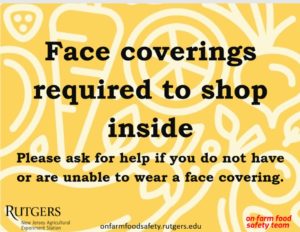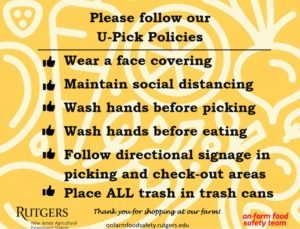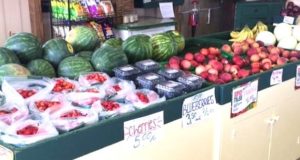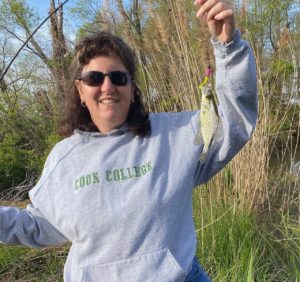Communicating your policies to customers is critical during this season, especially about your COVID-19 policies. Printable signs have been developed for use on New Jersey farms. Click on the images below for a direct link to the letter-size paper printable of each sign. Visit the Rutgers On-Farm Food Safety COVID-19 website for more resources.
Cloth face coverings and gloves must be made available to employees by the business. Employees must wear a cloth face covering and gloves but may supply their own if they prefer. Customers must wear a cloth face covering while on the property of essential retail businesses. If a customer cannot or is not willing to wear a face-covering you must consider alternative methods of selling your food to them. An order can be taken over the phone, or in a parking lot. Options include phone ahead orders or parking lot orders where staff select the items for the customer.
Essential retail businesses must maintain social distancing in retail areas, and whenever possible in other areas.
Pick your own operations to need to enforce face-covering use and social distancing in both indoor and outdoor areas of the farm. Executive Order 122 requires the wearing of face coverings by staff and customers at essential retail businesses. Prominent signage with your farm policies will help convey the message and ample posting on your social media sites. You can create your own or use the one below.




 t webinar series, every Tuesday in May from 7:00-8:00PM to assist farmers with on-farm direct marketing operations to develop strategies for the 2020 season. This 4-part, weekly program will present and discuss the following topics:
t webinar series, every Tuesday in May from 7:00-8:00PM to assist farmers with on-farm direct marketing operations to develop strategies for the 2020 season. This 4-part, weekly program will present and discuss the following topics: ommitted to the agriculture industry and all interested in growing plants, raising livestock and essential resources related to agriculture. The program now features a new
ommitted to the agriculture industry and all interested in growing plants, raising livestock and essential resources related to agriculture. The program now features a new 
 ertain time together.
ertain time together.